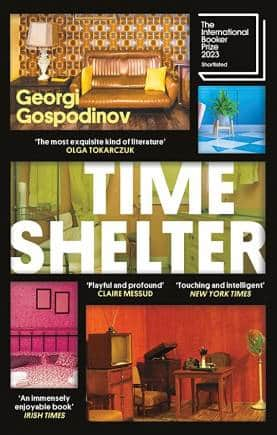



If I’m offered a chance to turn the clock back, I wouldn’t even hesitate for a moment. I’d happily go back to college and relive my youthful fantasies with a large group of friends, albeit with little money in my pocket. I can be young and reckless once again then. But would I have the knowledge that I possess now? I’m not sure about that. Also, would I still end up as a writer? That’s another hard question I cannot answer with a simple yes or no. Although the past is a safe haven, the future is the only place I can trundle toward.
 W&N; 304 pages; Rs 699.
W&N; 304 pages; Rs 699.But the Bulgarian author Georgi Gospodinov seems to have other ideas. He effortlessly goes back in time in the International Booker winning novel Time Shelter (translated by Angela Rodel). Reading it is like taking a plunge into cold water in winter. It may not be really pleasant at first, but you’ll somehow get used to the temperature sooner rather than later and begin to enjoy your time in the water.
In Time Shelter, a man, named Gaustine, creates a “clinic for the past” so that people who are suffering from Alzheimer's would be able to find comfort in the things that they grew up with. The clinic, so to speak, is more than an experiment. It brings back everything from a particular period, right from the soaps to the smells.
Each floor tile of the clinic is decorated according to the aesthetic of a decade from the twentieth century. In the age of artificial intelligence when several journalists and novelists are afraid of being replaced, Gospodinov traces his steps back carefully by putting the undiminishing power of nostalgia front and centre.
“The past is not just that which happened to you. Sometimes it is that which you just imagined,” writes Gospodinov. It’s an excellent statement that can be used for both literature and history. However, since Time Shelter sails on numerous boats at once, some jarring situations are either left unmentioned, or given less importance. While the wiping out of social media will leave the younger generations angrier and probably lonelier, how can the advancement in the field of medical science be rolled back? Won’t that work against the principle of survival?
When we view the past through rose-coloured glasses, we’ll forget about the messier parts. To Gospodinov’s credit, nevertheless, he dips his fingers into some of the major events that have shaken – and shaped – Europe. But the world is much bigger than a single continent and the past cannot be used as a quick-fix solution to solve all the problems, such as gender inequality and poverty.
Despite these logical quibbles, I couldn’t help but admire Gospodinov’s courage. Time Shelter boasts of both immaculate prose and a rich narrative technique. If the narrator of the novel says that he “invented” Gaustine in the opening pages, he, later, says that a third person could be writing about them both. Indeed, the third person is none other than Gospodinov himself. In a way, aren’t all characters invented by their respective authors?
I also liked the little chapters that are full of details about the folks who have started losing their memories – one man, in particular, gets worried about the safety of the singer John Lennon. Can words alone be enough to alleviate his fears? For people like him, the past will always run along with the present. And for people like us, the past is a place that can be visited only in our memories.
I’ll leave you with this pleasing part of a paragraph in which the narrator ponders over the past that is rooted in intimacy: “When people with whom you’ve shared a common past leave, they take half of it with them. Actually, they take the whole thing, since there’s no such thing as half a past. It’s as if you’ve torn a page in half lengthwise and you’re reading the lines only to the middle, and the other person is reading the ends. And nobody understands anything. The person holding the other half is gone. That person who was so close during those days, mornings, afternoons, evenings, and nights, in the months and years… There is no one to confirm it, there is no one to play through it with.”
‘Time Shelter’ by Georgi Gospodinov, translated by Angela Rodel; W&N; 304 pages; Rs 699.
Discover the latest Business News, Sensex, and Nifty updates. Obtain Personal Finance insights, tax queries, and expert opinions on Moneycontrol or download the Moneycontrol App to stay updated!
Find the best of Al News in one place, specially curated for you every weekend.
Stay on top of the latest tech trends and biggest startup news.